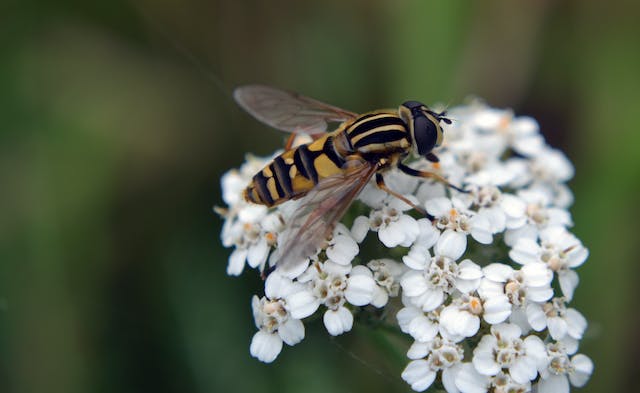Gardening in an earth-friendly way means understanding that there are sometimes going to be things that like to eat your hard work before you get to. Traditional methods of pest control is to treat with insecticides and pesticides but this is detrimental for two reasons. Firstly, there will always be some bug that will prove resistant to the insecticides and when they breed, they will pass that evolutionary benefit onto their offspring, creating a population that won’t respond to chemical means of control. Secondly, by destroying the pests, you eliminate a food source for the good bugs that you do want in your garden leading to a decrease in their population. When the pests come back, as they invariably will, there will be no predator population to keep them in check. The better solution to pest control, although the effects aren’t immediate, is to create a healthy ecosystem with a healthy population of beneficial insects.
Beneficial insects are a gardener’s best friend. They help to control pests, pollinate flowers, and improve soil health. Here are some of the most common beneficial insects you might find in your garden:
Ladybugs: These beetles are voracious predators of aphids, mites, and other soft-bodied insects. They are also known to feed on the eggs and larvae of pests. Ladybugs are attracted to plants such as dill, fennel and yarrow.
Green lacewings: These delicate insects have a voracious appetite for aphids, mealybugs, and other soft-bodied insects. They are attracted to plants such dill, coriander and angelica.
Praying mantis: These insects are known for their distinctive appearance and their ability to capture and eat a wide variety of insects. They are attracted to plants such as dill, fennel and yarrow.
Hoverflies: These flies are important pollinators and are attracted to plants such as marigolds, sunflowers, and alyssum. The larvae of hoverflies are also predators of aphids and other soft-bodied insects.
Parasitic wasps: These wasps lay their eggs inside the bodies of other insects, such as aphids and caterpillars. The larvae then feed on the host insect, eventually killing it. Parasitic wasps are attracted to plants such as dill, fennel and yarrow.
Tachinid flies: These flies are important predators of caterpillars and other soft-bodied insects. They are attracted to plants such as dill, parsley and coriander.
Ground beetles: These beetles are important predators of slugs, snails, and other insects. They are attracted to plants such as clover, alfalfa and vetch.
Soldier beetles: These beetles are important predators of aphids, caterpillars, and other soft-bodied insects. They are attracted to plants such goldenrod, yarrow and asters.
Braconid wasps: These wasps lay their eggs inside the bodies of other insects, such as caterpillars and beetle larvae. The larvae then feed on the host insect, eventually killing it. They are attracted to plants such as dill, parsley and coriander.
Attracting beneficial insects to your garden is easy. Simply plant a variety of flowers and herbs that are known to attract them. From the list above you can see that the best all-rounders are:
- yarrow
- dill
- coriander
- parsley
- fennel

You can also provide shelter for these insects by creating habitats for them such as bug hotels or by leaving some areas of your garden undisturbed. Additionally, if you place drinking water out for you wildlife, include some rocks in the basin so the insects have somewhere safe to land. By doing so, you’ll be rewarded with a healthy garden that has a more balanced insect ecosystem and less pests.
Banner photograph by Krzysztof Kamzol from Pexels: https://www.pexels.com/photo/macro-photography-of-hoverfly-on-flowers-758932/

